
2 minute read
PASIFIKA
NAMULAU’ULU LETITIA TAIHIA CLINICAL MIDWIFE MANAGER, NGĀ HAU MANGERE BIRTHING CENTRE
Inaugural Perinatal Mental Health Pasifika Fono
‘Tausi ma alofa I lou tino, ma lou loto, male mafaufau’ Take care of your body, soul and mentality (Samoan)
On a crisp spring day in September, those who work intimately with Pacific women and their whānau in the maternity space and beyond gathered under the majestic beams of Fale Pasifika at Auckland University, to explore issues through talanoa, hear about research and best practice, and make new connections.
Headlining the forum was esteemed health advocate and educator Fuimaono Dr Karl Pulotu-Endemann, well known for his groundbreaking Fonofale model for Pacific health (1984). It has been recognised as the holistic framework for Pacific wellbeing within the tertiary sector over several decades.
More recently, Fuimaono, together with Aotearoa’s only Pacific forensic psychiatrist, Dr Leota Lisi Petaia, launched the Kalisi model in June 2022. This model further enhances Fonofale, as it uses two women and their life journeys, reflecting and recognising the two worlds/communities that the Pacific diaspora faces in the New Zealand context.
Already adopted by a selection of South Auckland schools, it has been the foundation for innovative work with Pacific youth to encourage talanoa about mental wellbeing without stigma. This forum presented itself as a great opportunity to co-present with midwife LMC Dinah Otukolo (Tongan/Pakeha), to speak about the village model of care at Ngā Hau Mangere Birthing Centre (NHMBC) and why the uniqueness of the centre lends itself toward being a viable solution going forward, for improved services for all women and midwives.
A 2018 study discussing choice of birthplace for Pasifika women in Counties Manukau found low-risk Pasifika women were overwhelmingly choosing to have their babies at Middlemore Hospital rather than in a primary maternity unit. Whilst 10% of the women commenced labour in the primary unit, even less birthed in that setting. The findings stated they were heavily influenced by their community and midwife.
Culture and care are intrinsically linked and since 2019 when NHMBC opened in a suburb with Pacific demographics of 75%, it is no surprise that 52% of the births have been Pacific whānau and a further 27% Maori. The number of Pacific LMCs facilitating births at the centre is also the highest of any maternity unit in Aotearoa.
The kaupapa at Ngā Hau Mangere is to provide a high standard of clinical care with respect and kindness, preparing families for what’s ahead. This care translates into an environment that accommodates a support person to stay overnight in comfort. It is peaceful and quiet to recuperate, with good nutrition, evidence-based advice on parenting, and excellent breastfeeding support. Yet step outside its doors on a Saturday morning and you land in the heart of the Pacific. The aroma of ethnic food and music from the local market stalls embrace you and arrest your senses.
The fono presentations generated lots of discussion throughout the day in the open talanoa. The relativity of social inequities of poverty, poor housing, intimate partner violence, substance abuse and the plethora of other social outcomes could not be ignored as contributors to anxiety and depressive disorders amongst Pasifika women.
But of equal importance were the positive external factors of appropriate service providers, understanding cultural values to assist with choices through education, quality care and the inclusion of family, community, and an acknowledgement of a spiritual belief system. Collaborations are essential in the formation of a ‘village’ of support.
Fa’afetai lava le avanoa!
Attendees of the Inaugural Perinatal Mental Health Pasifika Fono.










